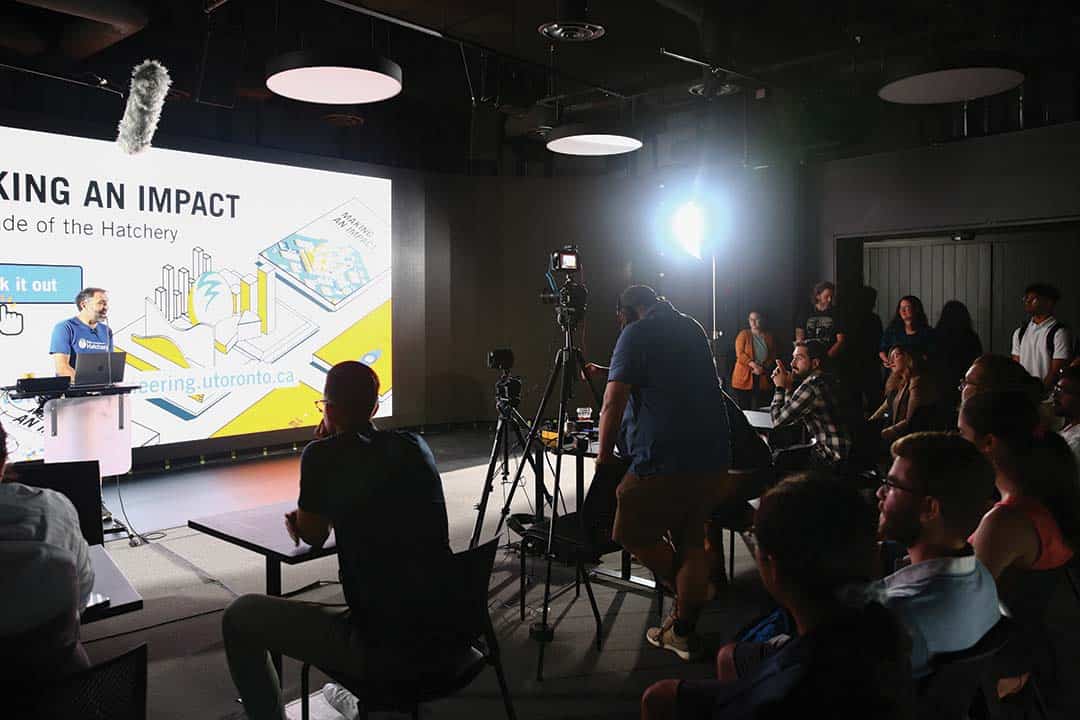Every summer, a group of U of T students have the opportunity to develop their entrepreneurial ideas at The Hatchery — U of T’s startup incubator. Participants undergo a rigorous, four-month long boot camp called NEST, where they are paired with mentors and advisors to develop business plans and bring their startups to life. The program culminates with Demo Day, a three-day event in which judges evaluate the startups and determine who will receive seed funding to take their ideas to the market.
This year, Demo Day took place from September 12–15, and the winners were announced on the afternoon of September 16.
Celebrating ten years of NEST
NEST has helped launch over 94 startups since the program started in 2012. These startups have carried out impressive initiatives, such as building robotic skeletons to provide physiotherapy to children with disabilities and creating artificial intelligence initiatives that speed up research. Kepler Communications, another product of NEST, raised over $20 million in seed funding to launch a model for its network of low-cost telecommunication cube satellites.
Successful Hatchery projects such as these have created over 600 jobs in the economy. Christopher Yip, dean of the Faculty of Applied Science and Engineering, describes The Hatchery as a “startup for startups.”
NEST is not just an incubator; on its website, it also describes itself as an “experiential learning opportunity.” The program supports participants as they wear an entrepreneur’s hat, riding out the highs and lows of launching a business idea. At the event wrap up, Yip stated that Demo Day invites students to “think big.”
Andrew Yang Ki is a member of the operations team at The Hatchery. “Speaking with any of our founders, it’s very easy to see the passion they have for their work, and I’m glad that the Hatchery is here to support their endeavours,” he wrote in an email to The Varsity. “As an ‘entrepreneur-in-training’ myself, it’s really great to see that the University is dedicating these resources to supporting affiliated startups,” Ki continued.
Using a virtual platform
This year, The Hatchery hosted Demo Day using the platform Pheedloop, a startup it had incubated some years prior. Pheedloop is an online platform for hosting hybrid events. It saw a total of 1,100 visitors over the course of the three days of the event as U of T alumni all over the world were able to tune in and witness the startup showcases.
This year, eleven teams took to the stage with a wide variety of ideas, from a software to lower marketing costs for firms, to a solution that bridges the gap between data engineering and neuroscience. There was also a technology that makes note taking easier for students, and an artificial intelligence solution that helps people take control of their gluten sensitivities.
The winning pitches
The four lucky winners from Demo Day were the teams Move Match, L33T Venture’s, Cove Neurosciences, and FallBye. They will now proceed to the go-to-market stage, in which more robust investors will help the teams make their product ready for the market. Yip describes these startups as the “drivers” for change as they take on the next stage of the entrepreneurial journey.
The Move Match team recognized that physiotherapy patients struggle to use static manuals without therapist supervision, which can elongate the healing process. They also recognized that it is impractical for physiotherapists to oversee every single one of their patients’ exercise sessions. Thus, the team has turned to AI and advanced motion analysis to give patients a professional level of coaching that they can carry out independently.
This technology will be highly catered to the patients’ individual needs, making the physiotherapy system much more efficient.
L33T Venture’s team tackles the challenge of the outdated bond market. Some parts of the financial system have evolved with the digital revolution; bond traders, meanwhile, still resort to phone calls for trading purposes.
This startup proposes to bring this multibillion dollar market into the 21st century by transitioning bond issuance and trading onto blockchain. This venture also aims to provide customers flexibility as they issue, manage, and trade tokenized bonds.
Cove aims to make neuroscience data more legible for academic institutions; MRI and electroencephalogram machines create noisy data at a high rate, which researchers struggle to interpret. Cove’s innovation uses machine learning and neuroscience tools to process this data, aiming to bridge the gap between data engineers and neuroscientists.
Finally, FallBye shared the staggering statistic that there are over 37.3 million falls in a year that require medical attention, but no mechanism to help prevent these falls among the children and elderly. The team’s innovation aims to bridge this gap.
Vishwa Eswaran, a member of the team behind FallBye, wrote in an email to The Varsity, “Our purpose is to support, empower, and enhance older adults by eliminating their fear of falls while protecting their dignity and promising comfort. Our vision is a world where ageing is more engaging. Entrepreneurship is a closed loop feedback driven uncontrollable, sometimes predictable process.”
Eswaran continued, “Our track from now, as we envision it, will be a strategic mix of parallelly running market research and product development activities. However, knots, pivots, ups and downs are waiting too, and we aim to tackle that without a dampening sense of enthusiasm.”
Disclosure: Andrew Yang Ki is currently an associate business editor at The Varsity.


